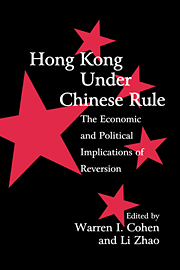Book contents
- Frontmatter
- Contents
- List of Contributors
- Introduction
- 1 Hong Kong as an International Commercial Center
- 2 Cooking the Rice without Cooking the Goose: The Rule of Law, the Battle over Business, and the Quest for Prosperity in Hong Kong after 1997
- 3 Hong Kong Faces 1997: Legal and Constitutional Issues
- 4 The Economic and Political Integration of Hong Kong: Implications for Government–Business Relations
- 5 Hong Kong and Greater China: An Economic Perspective
- 6 One Country, Two Currencies: Monetary Relations between Hong Kong and China
- 7 Political Participation in Hong Kong: Trends in the Mid-1990s
- 8 Strategic and Military Implications of Hong Kong Reversion
- 9 Hong Kong and China's Integration into the International Community
- 10 Hong Kong as a Problem in Chinese–American Relations
- 11 Post–July 1997 Challenges
- Index
6 - One Country, Two Currencies: Monetary Relations between Hong Kong and China
Published online by Cambridge University Press: 22 March 2010
- Frontmatter
- Contents
- List of Contributors
- Introduction
- 1 Hong Kong as an International Commercial Center
- 2 Cooking the Rice without Cooking the Goose: The Rule of Law, the Battle over Business, and the Quest for Prosperity in Hong Kong after 1997
- 3 Hong Kong Faces 1997: Legal and Constitutional Issues
- 4 The Economic and Political Integration of Hong Kong: Implications for Government–Business Relations
- 5 Hong Kong and Greater China: An Economic Perspective
- 6 One Country, Two Currencies: Monetary Relations between Hong Kong and China
- 7 Political Participation in Hong Kong: Trends in the Mid-1990s
- 8 Strategic and Military Implications of Hong Kong Reversion
- 9 Hong Kong and China's Integration into the International Community
- 10 Hong Kong as a Problem in Chinese–American Relations
- 11 Post–July 1997 Challenges
- Index
Summary
INTRODUCTION
IN the past fifteen years, the economic integration of Hong Kong and China has been impressive. The transformation of Hong Kong into a service economy and the opening of the Chinese economy have been interrelated processes, although each process alone is much broader and larger than its interrelation with the other. Moreover, each process is far from over, and a closer integration may follow.
Given that economic integration, many observers suspect that Hong Kong's reunification with China in 1997 will do little to strengthen it – and much to weaken it. Low expectations concerning the potential for strengthening and fears of reversal are the result partly of political considerations but mainly of misunderstandings about the two economic systems and how they have been evolving. By focusing only on the present differences between the two systems, the debate ignores the underlying transformation processes in the two economies.
In particular, the threat of change to Hong Kong's monetary system has been a source of concern. Notwithstanding the Chinese government's repeated assurances about the maintenance of the existing monetary regimes based on the Hong Kong dollar (HK$) and the Renminbi (RMB), there lies the presumption that some change is inevitable, because of either political considerations or economic reasons.
In this chapter, we analyze the economic rationale for the coexistence of the present monetary systems after reunification. Indeed, this amounts to addressing the rationale of monetary unification, the alternative to the coexistence of the two currencies. Not surprisingly, this is a unique experience.
- Type
- Chapter
- Information
- Hong Kong under Chinese RuleThe Economic and Political Implications of Reversion, pp. 133 - 154Publisher: Cambridge University PressPrint publication year: 1997
- 1
- Cited by



